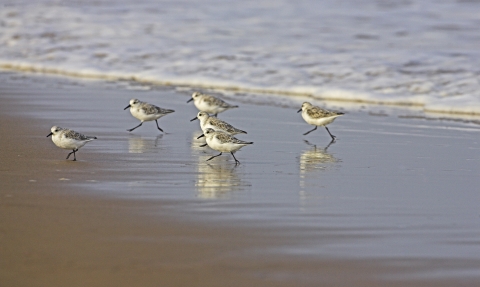
Sanderling © Mike Read / www.mikeread.co.uk
Protecting our coastal birds
The Solent is one of the most important coastal zones in the UK, providing an internationally important over-wintering area for waders, ducks and geese. As a result, it's recognised and protected at national and international levels.
However the Solent is also one of the busiest shipping lanes in Europe, and is heavily used recreationally by people on the water and at its very built-up edge. Combine this with rising sea levels, and our coastal habitats and the birds that rely on them are being squeezed out.
We've been at the forefront of work to conserve these critically important bird populations for over 15 years. We've worked to better understand which species are present, in what numbers, and which habitats are supporting them. In addition, we've worked in partnership with local authorities and organisations to coordinate our efforts and achieve better outcomes for birds along our coastlines.
Bird Aware Solent
We're one of the partners in Bird Aware Solent, a partnership organisation dedicated to raising awareness about the birds on our coastlines. One of their key aims is to reduce disturbance of coastal birds by human activity. It can be tempting to see our feathered friends up close, or let your dog off the leash to say hello, but unfortunately this can be harmful to their wellbeing.
Our coastal birds are quite easily startled, and will often take to the air if they feel uneasy. This uses up energy, which is essential for surviving the colder months and, in the case of some species, making the long migration home afterwards. What's more, once startled the birds will often stay on 'high alert' for some time afterwards, during which they stop feeding - this further depletes their valuable energy reserves.
Bird Aware Solent work all year round to help local people enjoy the presence of our coastal birds without disturbing them. Their passionate rangers can be seen along the coast in Hampshire and the northern Isle of Wight, talking to the public and raising awareness about the fascinating bird species you can see on the shore.
Solent Waders and Brent Goose Strategy
While protecting key areas is important, the reality is that many species depend on a much wider area for their survival. It's essential that we have a clear understanding of which sites are important for wintering birds. This is why we initiated a Solent Waders and Brent Goose Strategy, in partnership with other conservation organisations and local councils.
The first comprehensive survey was done in 2002. Since then it's been updated and expanded to include the whole of the Solent, including the northern coastline of the Isle of Wight. Through a programme of long-term surveying and mapping, over 15,000 records from 1,000 different sites across the Solent have helped us locate the key places that these bird populations need to thrive.
Most importantly we've been able to follow how birds move between sites, giving us a much better picture of the locations that now need protecting or mitigating when councils are making decisions on planning applications.
